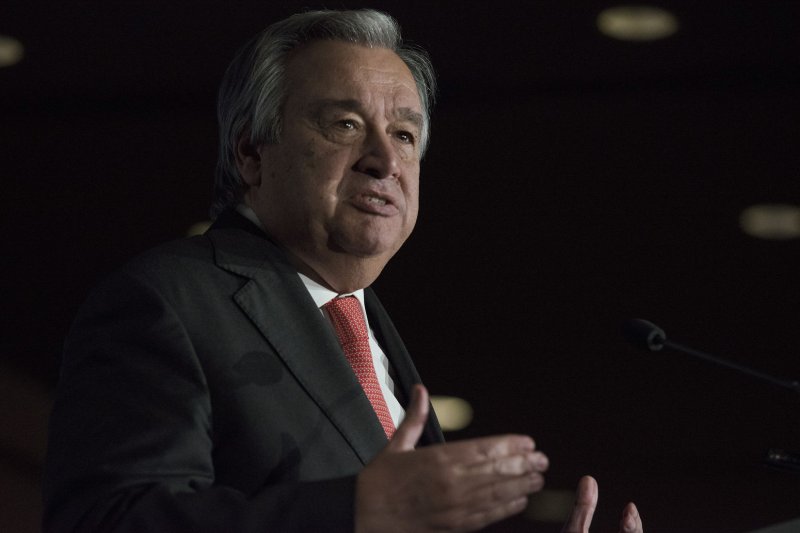1 of 4 | Antonio Guterres, United Nations High Commissioner for Refugees, addreses the audience during 'Out of the Shadows: Ending Statelessness in the Americas' at the Newseum on Nov. 18, 2014, in Washington, D.C. The event commemorates the 60th anniversary of the 1954 Convention relating to the Status of Stateless Persons and the Americas launch of the Ten-Year Global Campaign to Eradicate Statelessness. (UPI/Leigh Vogel) |
License Photo
WASHINGTON, Nov. 19 (UPI) -- The United Nations Refugee Agency reported Nov. 4 that in the last five years, "20 percent of all refugees resettled by UNHCR have also been stateless" -- not considered citizens or nationals by any state.
United Nations High Commissioner for Refugees Antonio Guterres and Anne Richard, the U.S. Assistant Secretary of State for Population, Refugees and Migration, teamed up Tuesday to honor the 60th anniversary of the 1954 Convention relating to the Status of Stateless Persons and to launch the Americas' 10-Year Global Campaign to Eradicate Statelessness.
Guterres has singled out the three-year-old Syrian civil war as "the biggest humanitarian emergency of our era" when the number of refugees surpassed three million in August.
"It's very difficult to have an effective long-term plan in areas where unpredictability is so strong," the U.N.'s top refugee official said to UPI Tuesday of the crises in Iraq and Syria, which have displaced more than 13 million people.
In order to anticipate the needs of refugees displaced by the protracted conflict, UNHCR strives to join "short-term perspective with the long-term perspective, and to have a common view that brings relief and development actors [together] to be able to address what are very complex problems."
The long-term strategy for Syria is "not perfect," Guterres acknowledged, citing the unpredictable nature of the conflict that has grown more complex following the rise of the Islamic State.
Richard noted in her remarks that statelessness affects "thousands of Syrian refugee children born without documentation and without fathers present to help secure their nationality."
"The war in the Middle East, in Syria, has torn families apart. And despite these circumstances, in Jordan, Lebanon, and Syria as well, the father must be present for a baby to be granted citizenship. And as a result, these children who have already faced unspeakable violence and instability in their lives and will have difficulty attending school, will also face the new and profound challenge of having no nationality, and it is a tragedy happening right now."
Guterres commended the U.S. for its leadership through advocacy, drawing attention to the often overlooked issue and by urging the 27 countries that have not yet complied with the convention to adjust their nationality laws so that statelessness can be eradicated.
The U.S. is also UNHCR's biggest financial contributor. "American society is a pro-refugee society," Guterres said, a point the assistant secretary echoed.
"We're very fortunate because our Congress provides us a healthy amount of humanitarian assistance funding so that we can lead in providing assistance to the U.N. refugee agency and to some of the other humanitarian agencies in the U.N.," Richard told UPI, adding "it's something I think we can't take for granted because it's counter to the budget cutting atmosphere in Washington."
"We have bi-partisan support for this... We're really hoping to maintain that despite, or even as, there are changes in committee assignments on the Hill," said Richard. "We really hope we can continue to count on Congress to provide funding because it makes such a major difference in the lives of all these human beings that we've been talking about."
Guterres pointed out that, unlike the U.S., there are "many countries [where] refugee protection becomes a divisive issue in the political system and elections sometimes are disputed based on different refugee policies." The U.N. head repeated his appreciation for U.S. commitment to helping the world's displaced.
"Fortunately, in the U.S., refugee protection... has always had a strong bipartisan support. And this is the best guarantee that refugees can have around the world," Guterres said.















